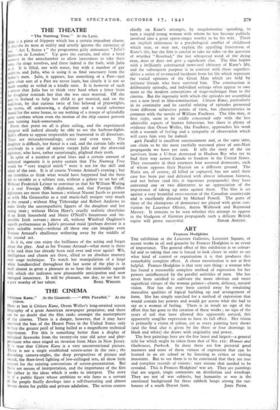THE THEATRE
"The Nutmeg Tree." At the Lyric.
gERE is a piece of frippery which has a certain impudent charm. It thumbs its nose at reality and utterly ignores the existence of war. Act I, Scene r " the programme gaily announces " Julia's Bathroom in London." Up goes the curtain, and after a brief moment in the antechamber to allow latecomers to take their seats, the stage revolves, and there indeed is the bath, with Julia m it. It is filled, not with water, but with a number of gay cushions and Julia, who is using it as final sanctuary from the broker's men. Julia, it appears, has something of a Past—just quite what sort of a Past we never learn. , but clearly it is not so much murky as veiled in a kindly mist. It is however of such a nature that Julia has to think very hard when a letter from her daughter reminds her that she was once married. Off she goes to Ireland to help her child to get married, and on the mail-boat, by that curious twist of fate beloved of playwrights, she meets, all unknowing, a diplomat and a social reformer hound for the same house, to say nothing of a troupe of splendidly gusty acrobats whom even the motion of the ship cannot prevent from turning back-somersaults.
From that point on all is plain sailing, and the experienced playgoer will indeed already be able to see the harbour-lights. Julia's efforts to appear respectable are frustrated in all directions. There are misunderstandings, crises and even tears. The daughter is difficult, her fiancé is a cad, and the curtain falls with everybody in a state of misery except Julia and the aforesaid diplomat, who have, rather surprisingly, plighted their troth.
In spite of a number of good lines and a certain amount of
technical ingenuity it is pretty certain that The Nutmeg Tree would be " very tragical mirth " were it not for the skill and talent of the cast. It is of course Yvonne Arnaud's evening ; but one trembles to think what would have happened had she been left to twinkle as a solitary star, without a galaxy to set her off. Without Frederick Leister to convince us that Sir William Waring is a real Foreign Office diplomat, and that Foreign Office diplomats are more than human ; without Naomi Jacob to present us with Ma Gennochio as a real music-hall trouper very much in the round ; without Meg Titheradge and Robert Andrews to make lively the unsympathetic figures of the daughter and her young man ; without Helen Haye's cruelly realistic chatelaine of an Irish household and Make O'Neill's bounteous and im- possible Irish servant ; above all, without Winifred Oughton's superb performance as Julia's personal maid (perhaps dresser is a more suitable term)—without all these one can imagine even Yvonne Arnaud's ebullience withering away by the middle of the second act.
As it is, one can enjoy the brilliance of the acting and forget about the play. And as for Yvonne Arnaud—what more is there to be said than has already been said over' and over again? Wit, intelligence and charm are there, allied to an absolute mastery over stage technique. To watch her manipulation of a large white handkerchief throughout the last scene of the play is in itself almost as great a pleasure as to hear the inimitable squeak with which- she indicates now pleasurable anticipation and now outraged innocence. It will be pleasure, one day, to see her in a
sl


























 Previous page
Previous page